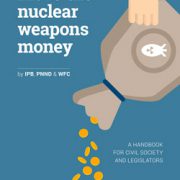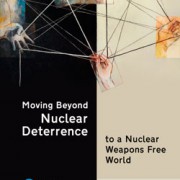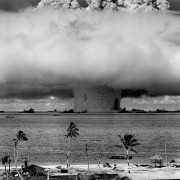The Climate-Nuclear Nexus: Two Key Threats Endangering Future Generations
Over the next two weeks, Heads of States are meeting in Paris to finally agree on a plan to curb climate change. Considering that climate change can exacerbate a range of interconnected transnational threats and crises that our generation faces today, such as extreme poverty, hunger, violent conflicts and pandemic disease, meaningful action is urgently needed.
Despite this, the proposed measures are again nowhere near proportional to the problem. In fact, the climate negotiations have so far been subjected to lack of information and misguidance on so-called solutions that should enable us to limit the rise in temperatures to 2°C. One particular problem is that too many of the intended nationally determined contributions (INDCs) still build on nuclear energy as a way for low-carbon development.
This is extremely problematic given that increased reliance on nuclear energy to reduce carbon emissions will contribute to the risks of nuclear proliferation. In these crucial times, current instabilities and geopolitical tensions are an important dynamic to consider. The increasingly aggressive nuclear threat postures between Russia and NATO in Europe, the rising nuclear tensions between China and US allies in the South China sea, and the excessive expenditures (over US$100 billion annually) on nuclear weapons consume resources required and undermine conditions conducive for tackling climate change in a cooperative manner. Further proliferation of nuclear weapons would make this even worse.
Climate change and the continued existence of nuclear weapons stand out as the two principal threats to the survival of humanity. On the long arc of human existence, both threats are relatively new to the scene, having only appeared over the last century. However, both threaten the survival of life on earth as we know it and both are of our making.
Jonathan Schell said it best: “Anyone concerned by the one should be concerned with the other. It would be a shame to save the Earth from slowly warming only to burn it up in an instant in a nuclear war.”
Nuclear energy is neither required for nor capable of solving the climate crisis. Nuclear energy lacks the capacity potential to significantly replace the huge amounts of fossil energy. In addition, the nuclear ‘fuel chain’ contains a variety of problems and risks, including the release of radioactive materials at every stage of the cycle and trans-generational safety problems from nuclear waste disposal. A very serious problem is the possibility, at various stages of the nuclear fuel chain, to divert nuclear technologies and know-how towards nuclear weapons development.
As the Word Future Council has highlighted in a recent report, climate change and nuclear weapons interact with each other in additional ways. Conflicts induced or exacerbated by climate change could contribute to global insecurity, which, in turn, could enhance the chance of a nuclear weapon being used, could create more fertile breeding grounds for terrorism, including nuclear terrorism, and could feed the ambitions among some states to acquire nuclear arms. Furthermore, as evidenced by a series of incidents in recent years, extreme weather events, environmental degradation and major seismic events can directly impact the safety and security of nuclear installations. Moreover, a nuclear war could lead to a rapid and prolonged drop in average global temperatures and significantly disrupt the global climate for years to come, which would have disastrous implications for agriculture, threatening the food supply for most of the world. Finally, climate change, nuclear weapons and nuclear energy pose threats of intergenerational harm, as evidenced by the transgenerational effects of nuclear testing and nuclear power accidents and the lasting impacts on the climate, environment and public health from carbon emissions.
Overall, the discrepancy between long-term goals and concrete steps undermines the conditions for international cooperation in security and climate policies. Despite growing awareness of the urgency of tackling the climate and nuclear threat among policy-makers, academics and civil society, concrete action is lagging behind.
Why is this so, when considering that renewable energy technologies provide viable alternatives? By harnessing local renewable energy sources, jurisdictions increase their political and energy independency, while the degree of local and international cooperation needed to transition to 100% Renewable Energy can act as a catalyst for cooperation in tackling other transnational security threats. This helps solving geopolitical crises, avoid future armed conflicts triggered by climate instability and resource scarcity, and build cooperative security mechanisms. Similarly, regional initiatives could attempt to tackle both climatic and security threats. For example, Nuclear Weapon-Free Zones (which already cover the entire Southern Hemisphere) can, in turn, promote regional environmental and climate protection policies, as exemplified by the Antarctic Treaty System. Such action could also be sought in the Arctic, where the effects of climate change and the dangers of nuclear weapons come together as increased competition over resources and the opening up of routes for military maneuvering and posturing, including with nuclear weapons, can heighten tensions between the region’s powers.
Finally, there exist international legal obligations both with regard to curbing climate change and achieving universal nuclear disarmament. It is thus not surprising that on both fronts, litigation has been pursued to ensure these obligations are implemented. Climate cases have been filed in several countries, including in the Netherlands, where the Court ruled in favour of the plaintiffs, noting that the State has a legal obligation to protect its citizens, ordering the Dutch government to reduce its CO2 emissions by a minimum of 25% (compared to 1990) by 2020. On the nuclear front, the Republic of the Marshall Islands filed applications last year in the International Court of Justice against the nine nuclear-armed states (US, UK, France, Russia, China, India, Pakistan, Israel, North Korea), claiming that they are in breach of obligations relating to nuclear disarmament under the NPT and under customary international law. Cases are proceeding against the three of the nuclear-armed states that have accepted the compulsory jurisdiction of the ICJ–the UK, India, and Pakistan.
For the people of the Marshall Islands, and a rising number of people in other parts of the world, the effects of these two threats are not a theoretical, future issue of concern. Behind the facts and figures are stories of real suffering from climate change and nuclear weapons programmes.
The plight of one group in particular is illustrative of the human impact of the nuclear enterprise and climate change. The inhabitants of the remote Pacific island chain of Bikini Atoll were forced from their homes in the 1940s so that the United States could test its atomic bombs there, bringing with it a legacy of transgenerational effects of radiation exposure, including high cancer rates, birth deformities and environmental poisoning. The lands they had called home were declared uninhabitable. Now, the tiny patches of earth they were relocated to in the Marshall Islands are at risk of suffering the same fate, as rising sea levels are breaching sea walls, washing over their islands, killing crops and forcing the Bikini Atoll refugees to consider relocating again–this time to foreign continents thousands of miles away. As if to underline the potentially catastrophic convergence of both perils, there is even the danger that rising sea levels could spill the radioactive waste from testing, which has been stored on the islands, into the ocean. Their experience should serve as a cautionary tale. If we don’t seize the opportunities soon to rid the world of these threats, we will drift toward a similar fate.
The World Future Council has been highlighting how climate change and nuclear weapons interact with each other through its ‘Climate-Nuclear Nexus’ project. Foreign Minister of the Republic of the Marshall Islands, Tony deBrum, received together with the People of the Marshall Islands the Honorary Right Livelihood Award on 30 November for initiating litigation in the International Court of Justice to ensure the nuclear-armed states uphold their disarmament obligations.
Originally published on








